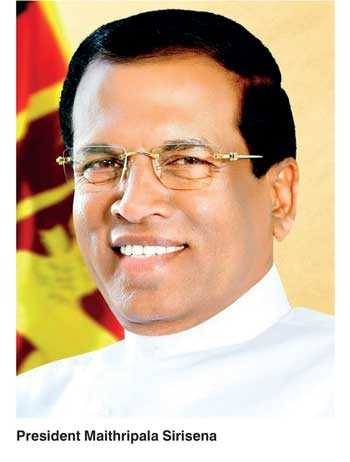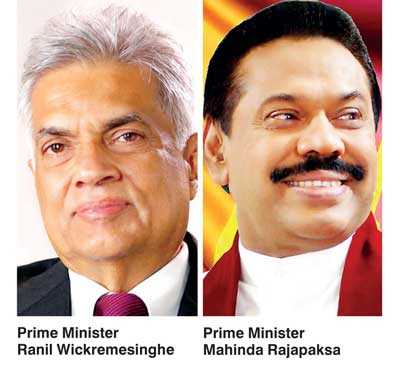Tuesday Feb 24, 2026
Tuesday Feb 24, 2026
Wednesday, 7 November 2018 00:44 - - {{hitsCtrl.values.hits}}
By Piyumani Ranasinghe and Dhanushka Silva
Sri Lanka is currently enduring a constitutional and political crisis, due to the events of the famous Friday evening, the ongoing regime change with the appointment of a new Prime Minister on 226 October. The political and constitutional implications of the constitutional coup against the brewing interpretations on the validity of appointing the new Prime Minister is taking the centre-stage in the national political arena. Interestingly, the differing framework of views between the two camps (in favour of the new appointment and in opposing the new appointment) has created a divide between loyalties, where currently, the situation is at an uncertain standstill due to the varying political undercurrents which operates behind closed doors.
Behind the sensationalism involved in the disturbing series of events, there is an array of constitutional and political implications on the island nation and its already debt-destined future. This plight that the nation is faced with can be redirected to the political and legal implications of the 19th Amendment to the Constitution. Whilst the Amendment rejuvenated the debate on democracy and good governance in an attempt to amend the powers of the Executive Presidency, on which the architecture of the 1978 Second Republican Constitution resides, it has also paved the way for inexplicable political and constitutional implications, including the current issue with the appointment of a new Prime Minister.
Divided camps and divided loyalties 
There are various interpretations to the constitution brought forth by two main political camps, those arguing in favour of the appointment (headed by the SLFP and SLPP) and those arguing against the appointment (headed mainly by the UNP). In the attempt to validate their respective positions, the pickaxes of both camps are not only hollowing out their respective galleries, but killing the spirit of Constitutionalism left in this country.
The SLFP and SLPP camp argues under Article 48 (1) that the Prime Minister can be dismissed, because the National Government dissolved once the SLFP ministers crossed over into the opposition on 26 October. The argument is that, these former Ministers were central to the existence of the National Government and at their departure, the National Government also collapsed.
However, it should be noted that, according to Article 43 (3) (3), whilst the President may at any time change the assignment of subjects, functions and even the composition of the Cabinet of Ministers, such changes shall not affect the continuity of the Cabinet of Ministers and the continuity of its responsibility to Parliament. Thus, the entire regime change that took place overnight, in the manner it did, is clearly unconstitutional. The power of dismissing the Prime Minister could be assumed as inherent to the power of appointment in the Constitution, prior to 2015. However, after the 19th Amendment, Article 46 (2) expressly specifies ways in which the Prime Minister vacates office, and this is why Article 42 (4) only allows the President to appoint the Prime Minister, and says nothing about dismissing the Prime Minister.
Generally, the power of dismissing the prime minister is vested with the Parliament, and not with the President, in terms of formal Parliamentary traditions. There are ways in which the Parliament can officially dismiss the Government and the Prime Minister, which involves the Parliament rejecting the Statement of Government policy or the Appropriation Bill (budget), or passing a vote of no-confidence in the Government according to Article 48 (2) of the Constitution.
According to the SLFP/SLPP camp, when the Cabinet dissolved on 26 October, the National Government under the leadership of Ranil Wickremesinghe ceased to exist, because he lacks the confidence of the Parliament. Alternatively, under Article 42 (4) the President has the power to appoint a new Prime Minister who, in his opinion, is most likely to command the confidence of the Parliament. The issue however is that, the Parliament has been postponed by the President, in the aftermath of the controversy. Leaving aside the perceivable ‘bad faith’ of such postponement, it is problematic as to how a Prime Minister can be dismissed without explicable proof of him lacking the confidence of the Parliament, and the inability to constitutionally prove the matter in the Parliament.
Dr. Jayampathy Wickramaratne notes that Ranil Wickramasinghe was appointed as Prime Minister (as per Article 42(4)) in August 2015, before the UPFA joined the UNP-government (i.e. before the National Government was formed in September 2015) – therefore, if the National Government is to be considered dissolved, then one should revert to the original position where Ranil Wickramasinghe is still the Prime Minister.
Thus, the squabble between self-interested political actors attempting to retain power by hook or by crook have stooped to a level where ‘SLFP/SLPP apologists’ now rely on heedless claims over interpreting inconsistencies between the Sinhala and English translations in the Constitution, which are none other than technical glitches.
Political implications of the 19th Amendment
Political implications of any law (irrespective how better it is) cannot be read independently, but only once the conflicting situations strike the bigger picture. Today, although the 19th Amendment is perceived to play a central role in the formal democratic lens, the political interests within the Amendment questions its capacity to address crisis situations. In other words, the politics involved with in the Amendment not only corrodes its democratic validity, but also legitimises certain moves of self-interested political actors.
Dr. Kalana Senaratne in a chapter entitled “The Politics of Negotiating competing Interests in Promulgating the Nineteenth Amendment and Twentieth Amendments” (in The Nineteenth Amendment to the Constitution edited by Dr Asanga Welikala) pointed out three predominant political objectives of the constitutional reform project undertaken by the anti-Rajapaksa forces since mid-2014. These political objectives now seem to affect the nature in which the 19th Amendment operates in the political realm. The first objective was to limit the powers of the Rajapaksa regime, by forcing him to accept certain democratic reforms. Secondly, politically aiming to defeat the Rajapaksa regime and to bring about a regime change, and thirdly to consolidate power of the new political leadership and establishment, while preventing the return of Rajapaksa. The events on 26 October depicts how these political objectives are now turning against the tide of the 19th Amendment, and are giving birth to many anomalies that are to break out in the course of Sri Lankan politics in the time to come.
For instance, the Amendment changed the age limit to thirty five years for a candidate to be a legally fit to contest for Executive Presidency, with the aim of obstructing the future of certain ‘political heirs’. Henceforth, the predecessors will have to iron out all possible ambiguities and play with the ‘rules of the game’ in the name of the heirs’ future. Moreover, the re-introduction of the two-term limit, prevents the return of certain political actors who possess the political currency that appeals to the ordinary citizenry. Irrespective of the constitutional hindrances to run for presidency again owing to the 19th amendment, the Rajapaksa regime still is extremely popular amongst masses. This builds their political leverage to challenge the Government and the existing governance structure, which is clearly evident in the aftermath of 26 October.
The political objectives of the 19th Amendment shifted the paradigms of the Executive Presidency, lowering the status provided for it under the original text of the Constitution. Significantly, it also changed the relationship between the President and the Cabinet, the Prime Minister and the Legislature. The President can no longer dissolve Parliament at his discretion before the lapse of 4 1/2 years, irrespective of the disagreements or anomalies that can arise within the polity (between the President and the Parliament), resulting in the disagreements or anomalies turning into political dilemmas lacking clear resolutions. In short, imposition of strict limitations on the “centre” (Presidential powers) while correspondently increasing the powers and the constitutional status of the Parliament and the Prime Minister, could leave the current political state at a deadlock.
Therefore, the 19th Amendment, the centre-piece brought by the ‘late’Yahapalanaya Government to strengthen the democracy, and especially its entrenched political objectives, has paved the way to disintegrate the whole system of governance promulgated by theYahapalanaya movement, where situations such as the present political crisis could remain unresolved for some time.
19th Amendment and the political future
The legality of the appointment of a new Prime Minister, dismissing the previous Prime Minister is surely problematic, because not only does it raise a legal question, but is also a hard blow on the democratic accountability of public representatives. The question of where the constitutional crisis is headed at, is still a question and most probably will remain a question in the time to come. This is because the political implications of the 19th Amendment will continue to have a bitter effect, due to the changing power dynamics of the current Sri Lankan political setting, particularly in terms of the powers of the executive. In other words, the political implications of 19th Amendment have opened the Pandora’s Box and the events on 26 October are simply a part of the bigger picture, which is still not apparent.
Piyumani Ranasinghe and Dhanushka Silva are currently reading for their LL.B. Degrees at the Department of Law, University of Peradeniya.